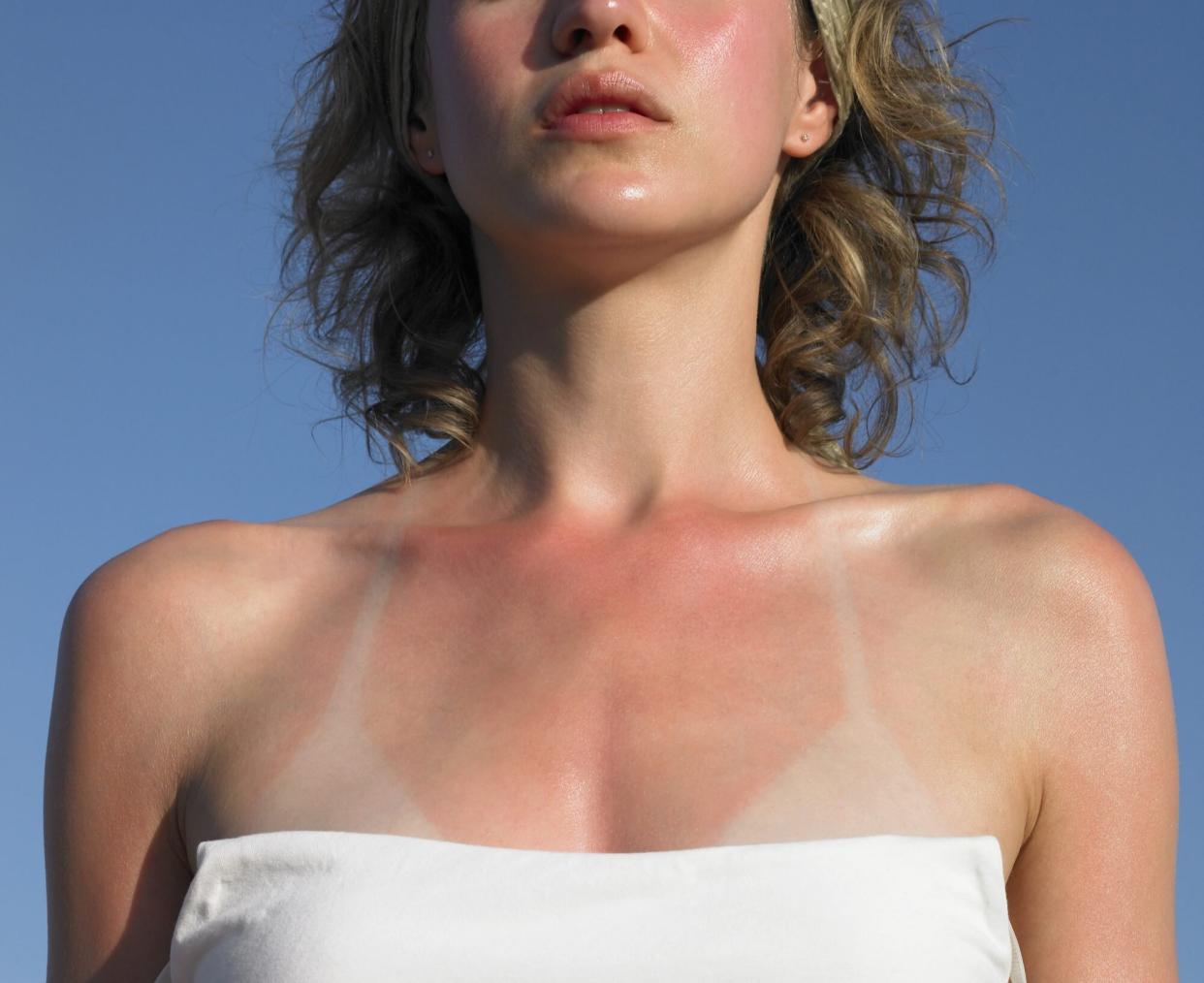You're Sunburned and Your Skin Is Peeling — Here's What to Do

Getty Images
Despite knowing that we need to reapply sunscreen every two hours to protect ourselves from the sun, doing so can often slip our minds. Unfortunately, that leads many of us to get a sunburn, and often, that concludes in peeling.
There's nothing fun about a post-burn peel: Everything hurts, it looks like your body has dandruff, and there's nothing much you can do about it except wait it out. So, we talked to three skin experts about why our skin sheds, how to treat it, if it's ever ok to peel the dead skin off, and when to know if it's time to see a dermatologist.
RELATED: The Absolute Best Sunscreens to Use Every Day, According to Dermatologists
Why Does the Skin Peel Post-Sunburn?
A sunburn happens when your skin gets too much sunlight and there's damage from its UV rays. "Oftentimes after a sunburn, you may notice some peeling and flaking from the epidermis — this is the body ridding itself of damaged skin cells, making way for new, undamaged skin underneath," explains Dendy Engelman, MD, a board-certified dermatologist in New York City.
After the initial sunburn, she says that peeling will start approximately three days later. "The skin begins to exfoliate itself by getting rid of all the burnt and damaged cells," explains PCA SKIN Peel Ambassador and celebrity esthetician, Candice Miele. Once it starts, it'll typically resolve itself within a week.
What's the Best Way to Treat Peeling Skin?
"Peeling skin is damaged and healing skin, so it's important to treat it gently," says Elyse Love, MD, a board-certified dermatologist in Manhattan.
Miele recommends first taking a cool bath, as hot water can further damage the skin barrier. Furthermore, she emphasizes the importance of keeping your skin hydrated inside out, so apart from increasing your water intake, make sure to use hydrating skincare products to treat the affected area.
To cleanse, Dr. Love says to stay clear of harsh soaps to prevent exacerbating the area. Instead, she says to use a gentle body cleanser, such as the Dove Sensitive Skin Body Wash, and a gentle facial cleanser, like the Avène Gentle Milk Cleanser. Then, to tone, Dr. Engelman says to look for an alcohol-free formula. "I recommend Humphreys Nourish Witch Hazel with Aloe Alcohol-Free Toner to soothe burnt, peeling skin as it helps balance your complexion while the unscented, nourishing aloe formula helps moisturize and soften for clean, calm, and conditioned skin."
Once the skin has been thoroughly cleansed, it's time to go in with thicker hydrators. Dr. Love says to look for soothing balms, like the Avène Cicalfate Restorative Protective Cream, or a hydrating moisturizer. She recommends the Obagi Clinical Kinetin+ Hydrating Cream, which she says should be applied multiple times throughout the day to prevent dryness.
Last, but certainly not least, is SPF. "Sun protection is of the up most importance as the skin's sun-protective and repair mechanisms are overwhelmed," explains Dr. Love. When your skin is peeling, she says that the higher the SPF, the better. Miele recommends the PCA SKIN Active Broad Spectrum SPF 45, which can be used for the face and body, as it contains zinc oxide and doesn't feel greasy on the skin. Plus, it's water-resistant for up to 80 minutes, meaning you don't need to worry about your sunscreen sliding right off as you sweat or if you take a dip in the pool.
VIDEO: When You Apply Sunscreen in Your Skincare Routine Actually Matters A Lot
Is It Ever Ok to Peel Your Skin?
If there's dead skin peeling off your body, it can feel nearly impossible not to pick at it and peel it off. However, it's really important to avoid doing so.
"Let it flake and come off on its own, otherwise you risk peeling the skin too soon and damaging the healthy skin underneath," warns Dr. Engelman. "If it's really bothering you, you can carefully apply a lightweight aloe lotion or another soothing moisturizer, and let the looser pieces of skin gently ball up and come off on their own."
Not only can peeling the skin irritate and further damage your skin, but it can have aesthetic side effects, too. Miele warns that peeling skin off can cause hyperpigmentation. "You can seriously damage your skin and leave dark spots that can scar," she furthers. Instead, she says to stick to treating the area with hydrating products every day.
When Should You Visit a Dermatologist?
While peeling is a common side effect of sunburn, other signs could be much more serious. "Swelling, blistering, scabbing, fever and chills, and faintness and disorientation are all signs that your sunburn may be more serious," says Dr. Engelman, who says that if symptoms don't improve over a few days to go see a doctor immediately.

